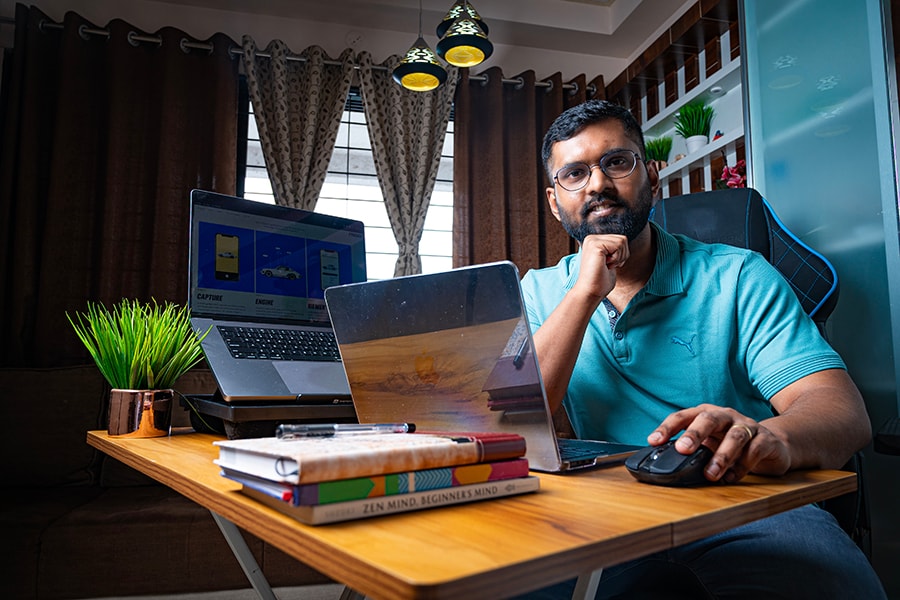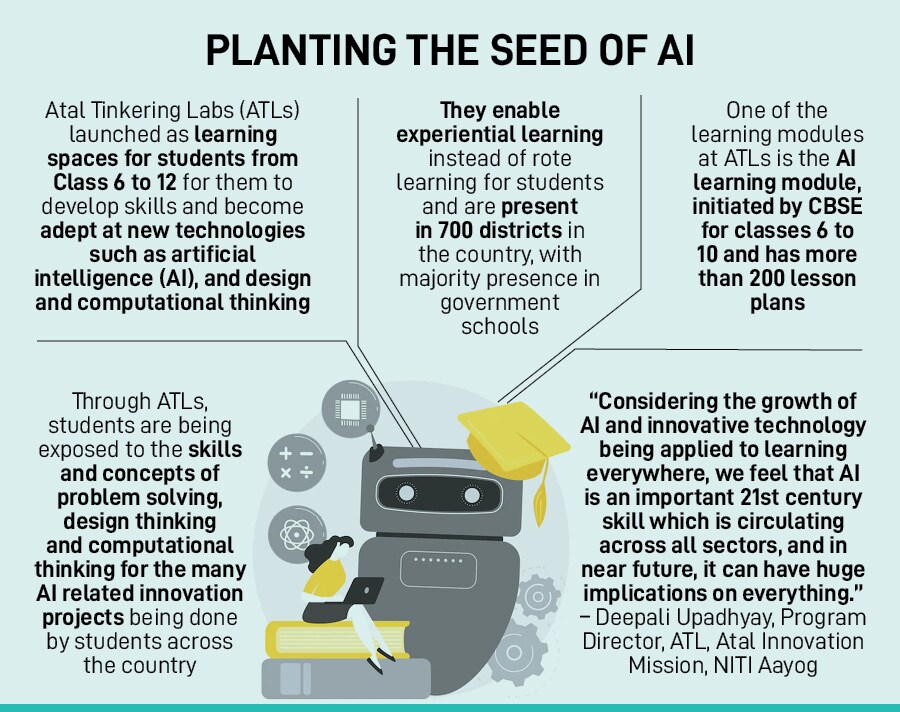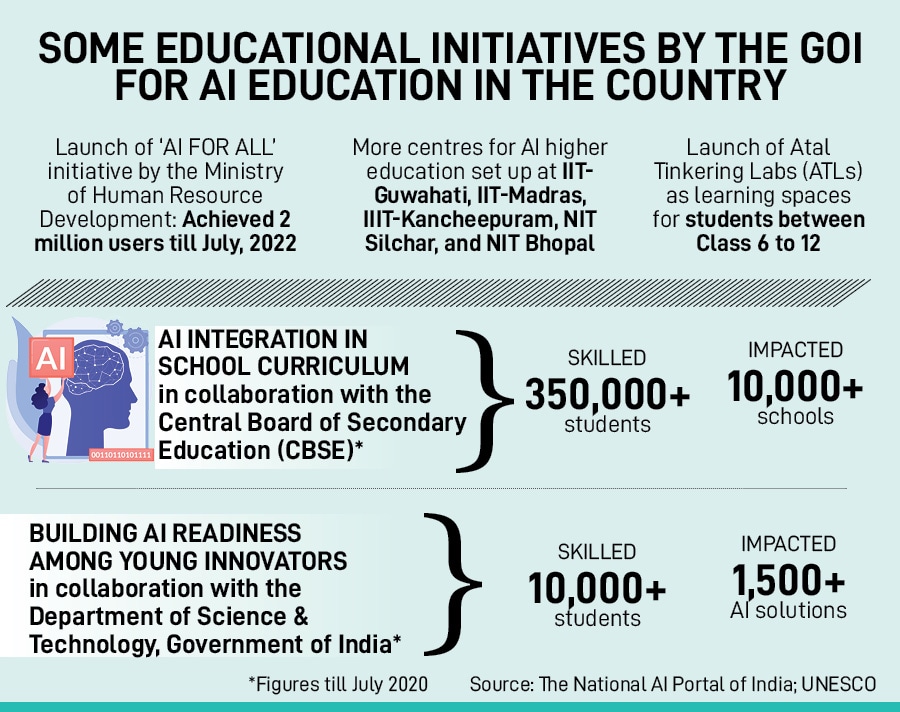From schools to colleges to edtech platfroms, here's how AI is revolutionising e
Colleges and edtech platforms have introduced courses in artificial intelligence, thanks to the advent of ChatGPT and its counterparts. Will this demand sustain?


[br]
Towards the end of 2022, as artificial intelligence (AI) chatbot ChatGPT was becoming the buzzword post its launch, Arvind Singh used it for the first time and was sure that a revolution has begun. “As a startup, I knew we had to start accelerating our AI projects immediately," reckons the founder of startup Superbolter, a platform that allows users to design their own homes in minutes, like Canva, but for your house.
Singh has always believed in continuous learning in his entrepreneurial journey. This time was no different. Along with his team, he started taking up tutorials around Generative AI and ChatGPT about three months back on edtech platform GrowthSchool.
With the learnings from these courses, SuperBolter is incorporating Generative AI into its existing AI tech. “The introduction of generative AI has significantly enhanced our existing algorithms, enabling us to transform 2D floor plans into immersive 3D house constructions. With AI, users can explore renovation options for their rooms or generate fresh designs from scratch, all in a matter of seconds," explains Singh.
He is only one of the many professionals and students, preparing to take the AI revolution head on.
Experts reckon that India could become an “AI outsourcing hub" for the world, with a massive tech talent pool. Tech industry body Nasscom reports that India houses over 2,700 global capability centres (GCC), of which, more than 65 percent are companies headquartered in the US. According to a FICCI-Access Partnership report, it is estimated that use of generative AI to supplement work activities could help unlock $621 billion of productive capacity across the Indian economy, equivalent to 18 percent of GDP in 2021. For the right workforce to be produced, India needs to prepare its existing and upcoming workforce with the right skills—AI education is at the centre of it all.
In the last couple of months, the demand for educational courses around AI/ML has shot up dramatically. For instance, "Our existing AI& ML programmes saw a growth of 68 percent from last quarter to this quarter [till 19 June]. The demand for Generative AI is just incredible," says Mayank Kumar, co-founder and MD, upGrad.
But the question is, will this demand sustain or is it just another bubble that will burst soon?

Rohan Bhale, senior iOS developer at Fyusion took up a Post Graduate Diploma in Management (PGDM) in AI and ML on upGrad to upskill himself Image: Swapnil Sakhare for forbes India
Rohan Bhale has been developing applications for startups for over a decade. During the pandemic, when he had some spare time post work, Bhale decided to take up a year-long course—Post Graduate Diploma in Management (PGDM) in AI and ML—on upGrad. "I wanted to upskill myself to stay ahead of the curve," recalls Bhale. After completing the course, the only jobs available in the market were AI-driven. Bhale, however, was looking for a specific role: Developing applications around AI and ML.
Finally, two months back, he got the job he wanted at software company Fyusion, as a senior iOS developer. "The course taught me the technical skills that I needed for my current role. For instance, I learnt Pandas AI, which is an important skill when doing AI and ML, but it is also a helpful tool when you"re doing analysis around data, which helped me arrive at some data-driven decisions," adds Bhale. To make the most of this increasing demand, almost every edtech platform, government or private university now has some form of AI offering.
Edtech platform upGrad is revamping its curriculum to embed the fundamentals and architecture of GPT for 34 courses. Recently, upGrad also launched a three-year programme: Doctor of Business Administration (DBA) in emerging technologies (specialisation in Generative AI) with its American partner, Golden Gate University, San Francisco. “On the first day of program launch, we saw an unprecedented demand for the curriculum, as it has a component that allow learners to build their own prototype model. And because of this experiential element, we were oversubscribed by 2x on day one," says Kumar of upGrad.
"We want to position upGrad as a GenAI partner," he says. Not only is upGrad teaching Generative AI, but they are also using AI-powered learning tools, to enhance the learning output and engagement for learners. “For instance, we have built an AI-powered chatbot to allow learners to conduct mock interviews at their convenience. We are also working on introducing an AI-platform for students to practice coding on in case you make an error, the bot will correct you immediately," adds Kumar.
Evidently, people are waking up to the fact that AI is no longer a concept that is limited to coders and engineers. “When OpenAI released GPT-3, it was like opening Pandora"s box. Suddenly, with Microsoft’s Bing & Google’s Bard, AI was accessible to anyone and everyone with an internet connection," says Vaibhav Sisinty, founder, GrowthSchool. Learning about it in some form, is necessary.
The most takers for GrowthSchool’s AI courses are people in the 23-35 year age group, who are at the start of their careers and looking for the next big leap. There are also experienced professionals who are learning AI to stay relevant. “The job market is screaming for people who know their way around AI. If you"ve got AI skills, you"re holding a golden ticket for career growth," reckons Sisinty. “It"s also about survival. No one wants to be left out or become obsolete."
The courses at GrowthSchool allow students to get practical and comprehensive knowledge around AI, instead of just theory. “These courses [offered by GrowthSchool] are highly experiential, allowing us to learn by doing. As a lean team, we often face skill gaps and lack the necessary expertise. We have engaged in multiple courses that suited our needs," says Singh of SuperBolter. Sisinty finds that the demand for AI skills is across all sectors, with tech companies and startups at the forefront. Even sectors such as healthcare, education and marketing is stepping up to use AI in some form.
****
Not only young professionals, but even students see the opportunities that are making headway due to the advent of AI. Akshita Mishra, 23, is set to move to the UK for a two year programme in MSc, Data Science and AI at the University of Liverpool. It has a year of academic learning and the second year for hands-on industrial experience. Mishra will need to pay close to £32,000 as tuition fee—nearly double the amount compared to a UK resident—excluding all other lodging and basic expenses.

So, why choose an AI course abroad and not in India? “I researched and realised that institutions abroad offer a broader range of AI-related courses, specialisations, and interdisciplinary programs. Another big reason for me to choose a course abroad was the cutting-edge research facilities available abroad including state-of-the-art laboratories and resources dedicated to AI research," says Mishra. She adds that a course abroad will also lend itself to the proximity to established tech hubs and AI industry leaders, which will eventually lead to better job opportunities.
While Mishra might be one of the few students who could afford to move abroad for her post-graduation, there are others who can’t. So, even Indian private and government institutions are also beginning to offer AI courses.
Like the SP Jain School of Global Management. “The institute introduced a program called Master of Artificial Intelligence in Business, a six-term program spread over two years, in November 2021. Although the program didn’t receive an overwhelming response to begin with, since the advent of ChatGPT, it has seen an uptick in applications," as per Debashis Guha, director of machine learning at SP Jain. The demand for the course is highest among fresh graduates, followed by professionals and business executives, he claims.
Another private institution, Universal Business School, has recently relaunched as Universal AI University. It will offer undergraduate and postgraduate specialised courses in AI. Tarun Anand, chancellor and founder, Universal AI University says, “We are hoping to introduce AI-enabled education across streams, from liberal arts and psychology to economics and business. We want to give students a foundational understanding of how AI can be used in various use-cases." The idea is to look beyond the coding and technical side of AI. The campus in Karjat, Maharashtra, claims to have state-of-the-art experience centres and labs for students to have a more hands-on experience. “The challenge," adds Anand, “is to find good faculty who can teach in-depth and relevant AI courses. Along with students, teachers will also need to go back to the drawing board and relearn."

To aid the learning of AI for engineering students, the government has launched AI courses at a number of Indian Institute of Technology (IIT) campuses including Bombay, Delhi, Kharagpur, Patna, among others, and also at the National Institute of Technology (NIT), Silchar, and NIT Bhopal.
According to Debanga Raj Neog, assistant professor, Mehta Family School of Data Science and Artificial Intelligence, IIT Guwahati, “The courses at IIT Guwahati provide the students exposure to the problems that are interdisciplinary in nature and can be solved using tools from AI and data science." These courses are being offered since 2022. Neog believes that integration of AI courses in schools and colleges, will revolutionise education and prepare students for “real-world" application of the technology across sectors. He adds, “This integration aligns with the National Education Policy"s vision, recognising the significance of contemporary subjects like AI in the regular curriculum. Overall, integrating AI education into mainstream education equips students with essential skills and knowledge to thrive in an AI-dominated future."
It is also key that school-going children are also taught AI as part of their school curriculum. “It will enable them to appreciate the power of AI and help build skills in understanding large data sets, recognizing patterns, and help them apply AI algorithms," says Kamlesh Vyas, partner, Deloitte India. The key here would be the delivery and management of the way AI is taught, particularly in schools. According to Vyas, personalised learning catering to specific student needs and potentials will go a long way.
ChatGPT or Generative AI has been a buzzword for the last few months. But will this AI-bubble sustain? Experts and industry players think so.
“AI and its impact on various sectors isn’t a bubble because it is based on leveraging a scientific tool that can be extremely practical and can solve real world problems," explains Vyas. If India is to become a hub for the AI, a greater democratisation of AI education, is the need of the hour. upGrad’s Kumar says, “AI is here to stay. I see it having as meaningful an impact, as the Internet had on us."
First Published: Jun 26, 2023, 09:49
Subscribe Now